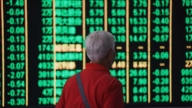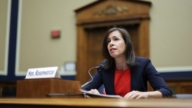【新唐人2013年10月05日訊】日本野村控股公司證券(Nomura Holdings Inc.)近日稱,中共地方政府的債務規模最近幾年擴大了39%,情況令人擔憂。野村經濟學家認為,中共決策當局可能會容忍明年部分地方政府債務出現違約,來加強市場紀律。這也就意味著,中共可能拉開地方政府破產的大幕。請看報導。
野村證券首席中國經濟學家、報告作者之一張智威,在9月26號發佈的報告中寫道,截至2012年底,地方政府融資平臺債務較2010年成長39%,達到19兆元人民幣,這相當於國內生產總值(GDP)的37%。
張智威說,「流動性風險正在上升」。
他還表示,基於該銀行對869個地方政府融資平臺的調查研究顯示,如果不是得到了地方政府支持,去年有超過一半的地方債務存在違約風險。
這份報告還指出,中共當局明年可能容忍一些個別信用違約發生,提高市場約束力,以此警示其他地方和投資人。
美國南卡羅萊納大學艾肯商學院教授謝田:「違約的意思就是已經defoult了,就是破產了,那個債務就一筆勾銷了,這個政府也破產了,然後其他誰投資誰倒楣了。」
美國南卡羅萊納大學艾肯商學院教授謝田表示,「野村」提出的中共允許地方政府信用違約有兩種可能,一種是證券證卷報的猜測,另一種是高層的放風,來試探國內外的動靜。
北京天則經濟研究所副所長馮興元指出,在地方債務劇增的情況下,政府必然會發生違約。
北京天則經濟研究所副所長馮興元:「我計算地方政府的債務大概有40%到50%,佔GDP,全國的總的債務已經達到86%到90%多。中國的很多縣,它的負債額已經是地方財政的5到10倍,它根本就還不掉,實際上就是破產的。」
馮興元認為,有資料顯示,近兩年地方政府的債務,幾乎翻了一番,非常嚴重了。
最近幾年,銀行貸款與地方政府債務數額飆升,成為中國經濟回升的主要驅動力。特別是,在08年4萬億的刺激下,大量專案上馬,目前地方政府設立了超過10,000家融資平臺為基礎建設項目融資。但現在很多公司只能靠「借新還舊」度日。
北京師範大學MBA導師段紹譯:「中國的政府是任期制,每一屆政府要做它的業績,要有政績﹔但是,它可以把債務留給下一屆政府。所以,任何一屆政府它都只想花錢,不想還錢,就惡性循環,政府的債務越來越多。」
著名經濟學家茅於軾唯一嫡傳的弟子段紹譯指出,如果中國的社會制度不改變,老百姓對政府依然沒有任何監督、約束機制,這種現象就不能被遏制。
其實,在今年7月美國《彭博社》調查的經濟學家中,有一半認為中共地方政府和企業不良負債,恐怕會對中國的信貸和經濟成長產生「顯著衝擊」。
為此,中共中央政府採取了一系列舉措,其中最明顯的信號就是,國務院7月底下令對地方政府債務進行審計。
本月11號,李克強也公開表示,「對大家都很關心的中國地方政府性債務問題,我們正在採取有針對性的措施,有序規範和化解。」
謝田:「中小城市,很可能是一些不會太引起巨大影響的城市,然後讓它們破產,不給它們幫助。破產以後呢,還會懲治一批官吏,可以殺一儆百吧。」
謝田認為,在中國向來是上有政策,下有對策,中共的這種方法也不能例外。但是那些沒有根基、沒有靠山的部分地方官員、民間企業投資者和一些私人企業就會成為受害者。
段紹譯則認為,中共當局很容易就能通過多印鈔票製造通貨膨脹、炒高房地產價格等方式,轉嫁債務危機到老百姓的身上。
採訪/易如 編輯/宋風 後製/王明宇
China Allows Local Government to Default on Debt to Solve Economic Crisis
Japan’s Nomura Holdings Inc. recently released a report
indicating that China’s local government debt
has increased by 39% in recent years.
A Nomura economic expert believes that the Chinese
communist authority may allow debt default
in the local government in order to strengthen market
discipline, which may lead to local government bankruptcy.
Zhang Zhiwei, chief Chinese economist at Nomura Holdings,
and one of the report writers, wrote in the report released
on Sept. 26, “by the end of 2012, local government debt
was up by 39% compared to 2010, reaching 19 trillion yuan,
which is 37% of China’s GDP."
Zhang Zhiwei says, “Liquidity risk is going up."
He also indicates that without local government support,
over half of local debts would have had debt default risk
last year, according to a study based on 869 local
financial platforms.
The report says the CCP authority may allow debt default
in order to enhance market discipline as well as
to warn other places and investors.
Xie Tien, Professor, Aiken Business School, University
of South Carolina: “Default means bankruptcy.
The debt would be written off.
The government would go bankrupt, and then whoever
invested would be unlucky."
Xie Tien indicates that there are two possibilities why
Nomura Holdings’ report points out that the CCP allows
local government to default on their debt.
One is that the information was a guess
made by securities news.
The other is that the high level CCP releases some
information to probe reactions at home and abroad.
Deputy Director of Beijing Unirule Institute of Economics,
Feng Xingyuan, says the government has
to default under the conditions of a sharp local debt increase.
Feng Xingyuan: “I calculated the local government debt.
It’s about 40% to 50% of the GDP.
The nation’s total debt is about 86% to 90% of the GDP.
China has many counties whose debts are five to 10 times
that of the local finances.
They definitely can’t pay off.
They are in fact already bankrupt."
Feng Xingyuan believes that there’s information showing
local government debt in recent two years has doubled.
It’s very serious already.
Bank loans and local government debt has soared
during recent years, which is the major driving force
of China’s economic rebound.
Especially, provoked by four trillion, many projects
were launched.
Local governments have established over 10,000 financial
platforms to get funding for infrastructure projects.
But many companies have to borrow money to pay debt.
Duan Shaoyi, MBA instructor at Beijing Normal University:
“The Chinese government is a tenure system.
Every session of the government want results,
political achievements.
But, they can leave the debt to the next session.
Thus, every session of government only wants to spend
money but doesn’t want to pay debt.
It’s a vicious cycle.
The government debt is more and more."
Duan Shaoyi, protégé of famous economist Mao Yushi,
says if China’s social system doesn’t change,
people won’t have supervision
and restraint mechanisms over the government.
Then, people can’t contain the increasing debt.
Half of the economists in the research published
in Bloomberg this July believe that the CCP local
government debt and company debt will have
an “obvious impact" on China’s credit and economic growth.
The CCP central government has taken a series of actions.
The most obvious signal is that the State Council ordered
an audit of local government debt this July.
On July 11, Li Keqiang said,
“We are taking specific measures to regulate
and resolve the local government debt issue
that everyone is concerned about."
Xie Tian: “The CCP authority will probably allow the small
and medium sized cities that won’t have a big impact,
to bankrupt and give no help to them.
After their bankruptcy, the authority will punish
a bunch of officials to warn others."
Xie Tian believes that China always has policies
and counter measures.
This time is no exception.
Without backing, local officials, civil enterprise investors
and some private enterprises will become victims.
Duan Shaoyi believes that the CCP authority
can easily print a lot of money, create inflation,
and push up real estate prices,
which passes the debt crisis to the people.




























